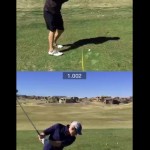It may be time for me to re-read Dr. Bob Rotella’s book “Golf Is Not a Game of Perfect”. Perhaps the audio version of Joseph Parent’s “Zen Golf: Mastering the Mental Game” might be a timely listen. Beyond an admittedly flawed swing, my confidence in my golf game is deteriorating. It has become difficult for me to get the ball in the hole. For the first time since I picked up the game in my early 20s, when I stand over a ball, doubt creeps into my mind. These qualms do not frequently occur on the driving range; a place of refuge where I am reminded that I can actually get the ball airborne. This perplexing paradox disturbs me as I realize that my poor performance emanates from my brain. Forgetting angles and swing planes, a synapse breaks between the range and the first tee.
I have sought the expertise from teaching professionals, purchased additional training aids and read books. I try to employ visualization when I practice, and frequently participate in rigorous exercise to ensure I am fit. My opportunity to practice is limited due to work, my sons’ sports and life. That said, my buddies have the same constraints, and their games have not been negatively impacted.
It is hard to admit that I am succumbing to mental weakness. As an extremely competitive person, I have always taken pride in my ability to focus when necessary. My golf swing has never been elegant, but I could get myself around a course in a respectable number of shots. At times, those scores would be in the mid to upper 70s, and came at fortuitous times. The pressure of the moment seemed to enhance my ability to deliver. If I have to be brutally honest with myself, I would say that anxiety has undermined any opportunity to succeed. As an example, I can execute a myriad of successful shots during a warm up session. However, when I step to the tee box, my swing becomes short, fast and inaccurate. Balls that flew straight, and in the vicinity of my intended target, now plunge to the ground nowhere near where I was aiming. Instead of focusing on successfully hitting the next shot, I am quickly overtaken with a sense of confusion. The constant in-round analysis of my poor swings leads to heightened tension and incremental uneasiness. To that point, the opportunity to play well is diminished.
The most difficult about dealing with cerebral issues is that trying harder does not equate to improved performance. I am not opposed to putting in the essential time, and making the required swing changes in order to improve. What has me perplexed is how I am going to repair my confidence? What are the tactics I need to employ to fix my brain?
This has been difficult to write as it exhumes an uncomfortable, personal weakness. No competitor wants to admit they are not self-assured when confronted with a challenge. You must believe you will succeed in order to have a chance at being effective. My mindset will have to change if I want overcome this test of my resolve.
